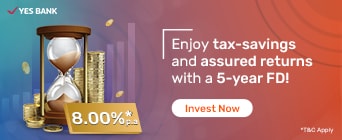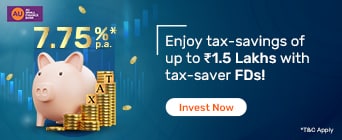Fixed Deposits (FD) are one of the most popular savings instruments in India. They involve depositing money with a bank or NBFC for a specific period. During this time, your deposit grows at a fixed rate of return, offering you the choice of earning compounded interest.
FDs are a great way to save money and build wealth for long- and short-term needs. They bear little to no risk as your returns are predetermined and not affected by market fluctuations.
Benefits of Fixed Deposits
Now that you know what an FD is and its many salient features, here are some advantages that you can enjoy when you opt for fixed deposits:
-
Enjoy the power of compounding by earning interest on interest in case of cumulative FDs
-
Liquidate your deposits when you require funds by making a premature withdrawal
-
Simple and straightforward process that can be initiated easily online
-
Avail an overdraft against your fixed deposit during unforeseen financial emergencies
-
Earn higher interest rates than a savings account
Features of a Fixed Deposit
Stable Returns
Flexible Tenors
Attractive Interest Rates
Minimal Deposit Amount
Regular Payouts
Auto-Renewal
Tax Benefits
Starting a fixed deposit is a financial decision that requires some forethought. Here’s how you can begin saving with an FD:
1. Compare Prevailing FD Rates
Before making any saving decision, compare the prevailing interest rates offered by major banks and NBFCs. This ensures you are well informed and are able to choose an FD that maximises your returns.
2. Choose Your Preferred Tenor
Broadly speaking, for short-term saving goals, you should consider choosing a short-term fixed deposit. However, if you are in it for the long haul, consider choosing long-term FDs. They are a great option to grow your wealth in a risk-free way.
3. Select Preferred Payout Frequency
Depending on your financial needs and goals, choose between a cumulative and non-cumulative fixed deposit. When you save with a cumulative FD, your interest is compounded. Both the interest and the capital amount are paid out at maturity. However, with non-cumulative FDs, the interest earned on your deposit is paid out at regular intervals as specified by you.
4. Choose the Mode of Deposit
With the rise in online FDs, booking an FD has never been easier. On the Bajaj Markets website or app, you can compare multiple FD options and book an FD with ease.
Key Things to Consider When Choosing a Fixed Deposit
It is imperative that you factor in your finances, goals, and other factors while making any savings decision. Here are some important factors to consider before booking a fixed deposit.
-
Risk Appetite
Your risk appetite is unique to you and your financial goals
-
Time Horizon
Choose a tenor that suits your financial goals
-
Assured Returns
Earn returns assured of at the time of booking
-
Financial Goals
Choose between short-term & long-term FDs, cumulative & non-cumulative FDs
-
Safety of Capital
Your investment is safe as it does not subject to market risk
FAQs
What are the different types of FDs?
There are various types of FD accounts that you can open with most issuers. These include standard, senior citizen, tax-saving, corporate, special tenor, cumulative, non-cumulative, and flexi-rate, among others.
Which type of FD is Best?
The FD type you choose mainly depends on your investment goals. If you are planning for a long-term investment, a cumulative FD with a longer tenor would be your best bet. Remember that the longer your investment timeline is, the higher will be your interest earnings.
If you are a senior citizen looking to manage your post-retirement expenses, a non-cumulative FD is ideal. This way, you can get monthly payouts to manage your daily needs.
How Do Fixed Deposits Work?
In a fixed deposit account, you will be able to park your funds over the duration of a tenor chosen by you and at a predetermined interest rate. You will be able to earn returns either on a monthly, quarterly or annually, as per the interest payout cycle. This is a relatively risk-free way of earning good returns over your idle savings.
What happens to an FD once it matures?
When your FD matures, you have two options - you can either choose to withdraw your investment or you may choose to renew your FD investment.
Can you renew or withdraw a fixed deposit?
Yes, you can either choose to withdraw or renew your FD at maturity.
Can I get monthly interest on an FD?
Yes, you can get a monthly interest payout on your FD by booking a non-cumulative fixed deposit.
Enter Your OTP








